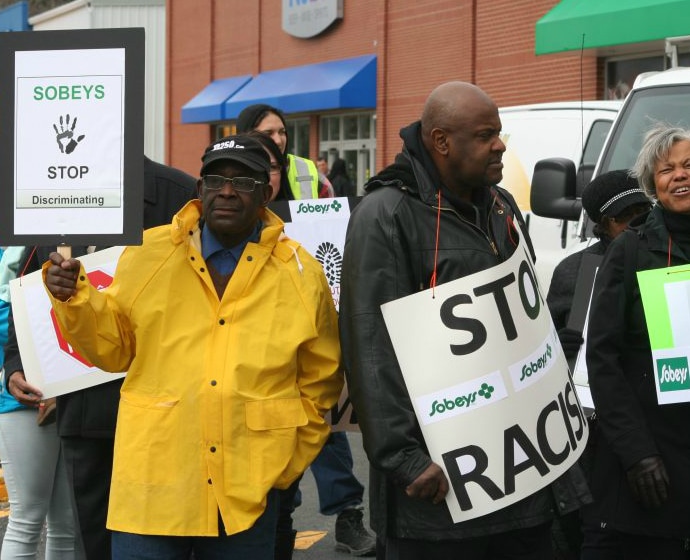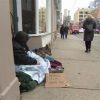
KJIPUKTUK (Halifax) – “Until we are all free, we are none of us free.” As we celebrate Natal Day, I keep thinking about this quote. Attributed to poet Emma Lazarus (1849-1887), it’s used often in social justice networks. I heard it most recently at the flag raising ceremony that marks the start of Halifax Pride. Robert Wright, this year’s Parade Ambassador, reminded us in his speech at city hall that we have to look out for each other. If I, as a white woman, have all of my rights (and even if I don’t), who will I now support? Who will I speak up for? None of us are free until all of us are free. There is no room for silence in a world without equality.
Within the white community I have seen some crazy doubling down: public silence combined with a privileged kind of outspokenness, a white on white outspokenness wherein a caucasian speaker just assumes that any other caucasian agrees with them. My most recent experience with that happened shortly after my partner and I had moved to Halifax. We were invited to dinner at the country home of a new acquaintance, a friend of a friend. It was an incredible spread and everybody was very kind. As we sat around the table talking, one of the women (white), apropos apparently nothing except, I suppose, to warn us about the seedier side of Halifax, started railing about the lack of leadership in the black community, how there was not one good black person, how everybody in the Prestons was dealing or ingesting drugs, how everybody was stuck in the past. She said all of this and more with grave disappointment as though the black community had let her down personally. I looked at my partner. I looked at the rest of the diners who were busy looking away. My partner and I challenged her. But she insisted. We were new. We just didn’t know. I was gobsmacked by what can only be called blatant racism and I was disappointed by the silence of the other whites who were, after all, friends of this woman. The most any one of them did was try to change the subject.
Sometime after this I was at a breakfast meeting with a white woman who ran a local well known and well regarded business. She asked how I was liking Halifax and I replied that I loved so much about it including that we could walk everywhere and that the people were so friendly. Except, I added, I’ve been kind of surprised at how segregated it seems. Without pause or breath, she launched into what seemed like a well practiced gripe bemoaning all African Nova Scotians with the time worn why can’t they get over it refrain. She had added something new though that, I have to admit, threw me off my game for a minute. The indigenous Brazilians got over it! Huh? You don’t hear them complaining about anything. Well, yes you do actually. But regardless, here it was again. That white person thing where they think they can say any stupid thing to another white person because, well… it’s another white person and of course they’re onside. And these were the so called “left” thinking people.
Racism is not unique to Nova Scotia — spoiler alert: it exists everywhere in Canada — just read the news for a day or two. Whether it’s racist attacks on public transit in Vancouver, turbans being ripped off the heads of Sikh men in Ottawa, white women yelling at brown men in Alberta, the list goes on and on and can feel overwhelming if you’re trying to envision a kinder, more enlightened world. And let’s not forget Coulton Boushie of the Cree Red Pheasant First Nation in Saskatchewan murdered by Gerard Stanley, a white farmer, and acquitted by an all white jury. Or the deep complexities of the Murdered and Missing Indigenous Women and Girls. All of these incidences barely scratch the surface of an encyclopedia of injustices that occur every day against people of colour.
My mother used to snap at us to try walking in their shoes every time we kids would complain about or laugh at some other kid or kid’s parent. I may not have understood what she meant at the time (I took things very literally) but imagine if you, because of your white skin, had to deal with being followed around stores because some sales clerk assumed you were going to steal something; or had to hear derogatory racial stereotypes from your co-workers; or what if you could never completely let your guard down in public because you knew it would be dangerous to do so? If you can imagine any of those things, you’ve just walked in the shoes of pretty much every person of colour every day.
I’m now into my 6th year residing in Halifax. Sometimes I think the only real thing that’s changed in terms of the racial divide is that I’m no longer surprised by it. But I’ve met a lot of progressive people since those first few months of white testimony. I think it’s fair to say that most Nova Scotians would not consider themselves racist. But it’s not enough to declare yourself a racist-free zone and then not call out racism when you see it happening. We have to stop pretending it doesn’t exist. We have to stop thinking racism is a black thing or a muslim thing or an indigenous thing and therefore up to “them” to discuss. And we definitely have to stop with the Canada is a place of refuge compared to the United States. Why set the bar so low?
Racism is alive and well in Canada and until we start talking about it — no, until we start doing something about it — we will continue to be that racist country. Our silence makes us complicit.
Joanne Bealy is a poet, writer, photographer, and gardener who lives in Halifax.
If you can, please support the Nova Scotia Advocate so that it can continue to cover issues such as poverty, racism, exclusion, workers’ rights and the environment in Nova Scotia. A paywall is not an option, since it would exclude many readers who don’t have any disposable income at all. We rely entirely on one-time donations and a tiny but mighty group of dedicated monthly sustainers.
Subscribe to the Nova Scotia Advocate weekly digest and never miss an article again.




Well written and good points!
I lived in Halifax for many years and now have lived in Vancouver for many years and I can tell you that the names change, the places change and the circumstances change but the need to put somebody else down doesn’t change. Call it racism, call it homophobia, call it classism call it anything that diminishes another for whatever irrational reason you can think of. It exists wherever humans find the need to exert their power over a weaker target. When our capacity for compassion exceeds our need for power we will see change.